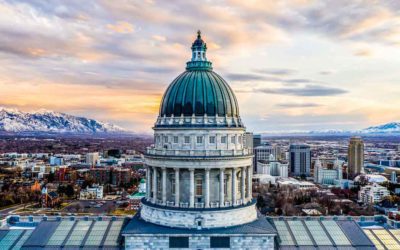
Written by Rick B. Larsen
September 17, 2019
Constitution Day means a great deal to me. I am wondering what it means to most Americans. I wonder if its significance has faded like an old photo, or worse.
The “worse” that I fear is based on a habit that we Americans have of viewing history out of sequence. We have become so good at it that we now view the framers of the Constitution as old men – when in fact the average age was 44 and more than a dozen were 35 or younger. We carry this notion they cobbled together a document when in reality they spent the equivalent of a baseball season in Philadelphia debating and considering every known concept of government – from Plato to Aristotle, from Locke to Rousseau.
We further diminish their work by pointing out their inadequacies. Our go-to criticism is slavery.
Rather than give the Founders credit for an architecture that eventually would turn against hundreds of years of institutional slavery and caste systems worldwide, we litigate the past – and their efforts and views – as if it happened just a few years ago.
What if we were to put history back in its proper sequence and realize that they drew upon history to see beyond their own day, daring to envision a new form of government? In order to do that, the wheel of history was required to turn many times. Countless experiments in government had to be tried and fail. The Enlightenment had to present its concept of human rights, given to all men from God – not from governments.
Prior to our Constitution, no nation had ever successfully established and maintained a similar concept of equality of rights in government – the type of equality we rightly demand today.
What if we stopped blaming the Founders and instead expressed gratitude and awe for their sequential and consequential place in the evolution of freedom? Perhaps then we could take responsibility for our own behavior and failings when it comes to what we have done with the legacy and blueprint they created for us.
Yes, we can all look back and rightfully say that one thing or another should have happened differently – should have come sooner. It all should have come right along with the American Revolution. But to insist our Founders were flawed – to the point of disregarding all respect and admiration for lighting the fuse on eventual freedom for all – is to ignore the sequence of history. We should not dismiss their genius but should revere it.
Charles Krauthammer believed that there was, and is, something very special about the Constitution. He noted no other nation holds its constitution in such high regard – or at least we did. He said, “I’ve always had a sense that there is something providential about American history. Here is a nation founded on the edge of civilization — a tiny colony, living on the outskirts of the civilized world — that at a time when it needed it miraculously produced the greatest generation of political thinkers in the history of the world. Then a century later, when it needed a Lincoln to save the republic, it found a Lincoln. In the first half of the 20th century, when it needed an FDR to get through the Depression and defeat fascism, it found him. In the second half, when it needed a Reagan to revive the country, he was there.”
The Heritage Foundation noted, “Part of the reason for the Constitution’s enduring strength is that it is the complement of the Declaration of Independence. The Declaration provided the philosophical basis for a government that exercises legitimate power by “the consent of the governed,” and it defined the conditions of a free people, whose rights and liberty are derived from their Creator. The Constitution delineated the structure of government and the rules for its operation, consistent with the creed of human liberty proclaimed in the Declaration.”
While pundits and journalists call for a new Constitution – a better and more modern one – so many people throughout modern history and around the world look at our Constitution as something to be revered, aspired to and emulated. It seems that only here in America, in a nation blessed by the many freedoms and liberties the Constitution affords, we find in our prosperity the time and inclination to disparage it.
This Constitution Day, may we pause from the popular critical stance and consider our treatment of the inspired legacy we have been given. If we are unhappy with the government we see today, a realignment of our view of history will suggest that our Founders do not owe us some debt based on an incomplete vision; rather, it is we who owe them a more virtuous stewardship of the miracle that is the American experiment.
More Insights
Read More
Why is Utah at odds with Justice Department over treatment of gender-dysphoric prisoner?
Lawsuit illustrates a little-known practice of federal agencies – giving various forms of “guidance” which are not supposed to be legally binding. The practice raises serious legal and constitutional questions.
What would a parent-teacher ‘handshake’ look like in Utah?
This partnership does not allow either party to pass blame entirely to the other. There is no scapegoat, only opportunities for either party or both to work on the factors within their scope.
Restoring “The Soul of Civility” in America, with Alexandra Hudson
Most people would agree that civility seems to be in short supply in our current political environment. But in recent years, a growing chorus of voices across the political spectrum has been calling for a return to principles of civility in politics, as well as all areas of public life.


